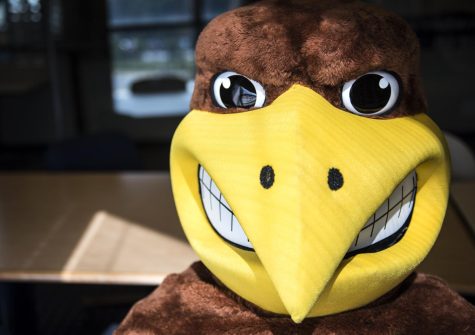Renegade blowers
March 16, 2010
Living on the edge, blowing glass
The life of the glass blowers at the Glass Bubble Project.
An ashtray full of cigarette butts and crumpled beer cans sit just outside the doorway with a sign that reads “Glass Blowing, Public Welcome.”
Items are for sale on shelves: paperweights infused with color, plants taking root in vases, plates attempting an interpretation of round and bouquets of fresh-blown flowers.
The clutter crowding the floor and hanging from the ceiling elicits a state of disorientation.
Overwhelmed eyes slide over a gumball machine, tools, ladders, a pile of wrestling action figures and a desk covered with nothing in particular.
The Doors pours through speakers, and Mike Kaplan, one of the founders of the Glass Bubble Project, stands among a group of guys.
“I’m a disrespected glass artist,” he says with a hint of apathy. “No one likes my work.”
His brown dreadlocks frizz at the roots and his worn T-shirt, decaying visibly, hangs off his skinny frame.
“I like that renegade blower that was here yesterday. He keeps telling us he lives on the edge … There’s no other way to walk than on the edge,” says one of the guys standing around the desk.
Just then Morty, a black rooster, walks over to drink from a small puddle of water accumulated on the cement floor, he flaps his wings and shuffles around, speaking an incomprehensible language.
In the center of the room at the workbench, a man named Mark Miller is busy blowing glass.
As he works, the furnace — a crumbling mass of salvaged brick — emits heat of 2,000 degrees. Tiny blond hairs stick to the perspiration on his forehead.
The molten, orange glass being blown into its perfume bottle destiny glimmers as the air from Mark’s lungs shapes it.
After rotating it in the “glory hole,” a recycled oil drum that serves as an oven used to re-melt the hardening glass while the artists work with it, he continues to shape it.
The music seeps from the speakers still:
“Drivin’ down your freeways/ Midnight alleys roam/ Cops in cars, the topless bars.”
A red tricycle hangs from the steel beams and wooden planks of the ceiling, among cylindrical cages containing statues of women and chandeliers made of salvaged materials like steel, drill bits and bicycle parts.
Dave Learn, one of the artists, is working in the same space Mark once occupied.
“What did you do with that piece?” Mike asks him, noticing a vase missing from the shelf where he had placed it.
“I put it in the back,” Dave replies. Nevermind as he dips the jar he is making into tiny shards of colored glass. “I’ll give it away before I’ll sell it for 10 bucks.”
He shapes the lump of slowly cooling glass, rolling and blowing it until it is round.
“Hey!” shouts a woman in a cloak-like black jacket and red hat from outside, waving her arms in the air frantically.
“Hey,” Dave shouts back before going to play some music.
Asking Mark if he likes Led Zeppelin while putting on the album, he turns up the volume:
“It was an April morning/ When they told us we should go/And as I turned to you, you
smiled at me/ How could we say no?”
Mike cooks hot dogs on the furnace and his dry, cracked hands reach out every so often to rotate them.
Morty sits on the floor basking in the warmth. His rooster feet carry him quickly away as Dave opens the door, revealing a pool of melted glass that he gathers to start a new piece.
“I want to hear that one again,” Dave says as Led Zeppelin’s “Achilles’ Last Stand” ends.
“I’ll see what I can do,” Mike replies, walking over to the stereo.
“One more time!”
The song starts again just as its melody begins to fade.
“Oh to sail away/to sandy lands and other days Oh to trust the dream, hides inside and never seen.”
The sound of Mark grinding down a bowl intermingles with the lyrics.
“I don’t want to hear that song ever again!” Mike exclaims as it ends. “Just kidding,” he laughs.
The songs get slower, fading inconspicuously into the background, until they stop.
The red second hand on the clock, which is attached to the pipes running along the walls, moves circularly. Morty perches on one of the pipes. Time elapses and the tree painted on the open garage door never grows.
“Want some more music?” Mike asks.
“Sure,” Dave says, concentrated as he continues to work.
Led Zeppelin resumes.
“Then as it was, then again it will be.” Robert Plant’s voice fills the room with “Like the stars of fortune… On the wings of maybe.”
Finishing up his last piece of the day, another jar, Dave breaks it off of the blowpipe.
He asks Mike and Mark if they are going to work on anything.
“That’s it,” Mike says.
Contact features reporter Nicole Hennessy at [email protected].






















